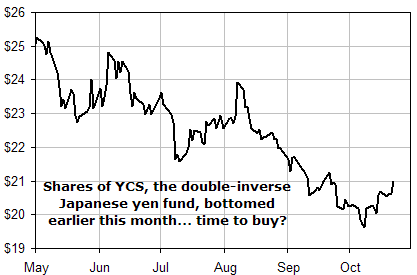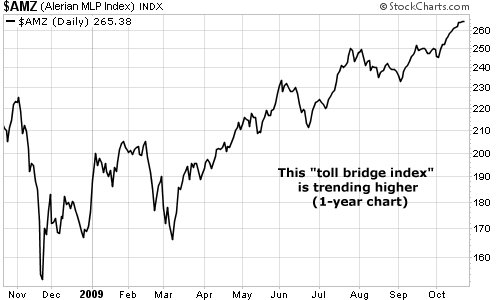| Home | About Us | Resources | Archive | Free Reports | Market Window |
The Next Currency to CrashBy
Friday, October 23, 2009
"What's your slam-dunk currency trade right now?"
I asked my friend Jack that question earlier this week... Jack's the best guy I know at currency analysis. I've known him for 16 years. Back in the mid-1990s, we worked 20 feet away from each other at a firm specializing in international investing. Jack taught me a lot about currencies and managing my trading (cutting your losses and such). This week, I drove down to tiny Palm City, Florida, where Jack's Black Swan Trading group is based. We spent a few hours catching up. Jack explained his favorite trade right now... and he explained an easy way for an individual investor to take advantage of it... In short, Jack thinks the Japanese yen today is like a ticking time bomb. It's ready to explode... We just don't know when. As of this month, the time may be right. You see, right now, the Japanese yen is extremely overpriced. It's just off a huge high versus the dollar. The only time it's been higher against the dollar was in early 1995. Since that's the only similar high in the yen's history, let's take a closer look at what happened next... In 1995, the Japanese yen was comically overvalued. Everyone knew it. But just like the last six months, the yen kept going higher. Then the bottom fell out. Soon after the yen peaked in 1995, it crashed... The yen lost 20% of its value in three months and a total of over 40% of its value in three years. That's an astonishing fall in the value of a developed country's currency. Back then, if you'd bet against the yen with just a little leverage, you could have made a whole lot of money – easily triple-digit gains... even more depending on how you traded it. Jack told me we're seeing a similar setup today in the yen... and the potential is there for similar gains. You see, the Japanese can't raise interest rates, since the economy is in the tank. And the Japanese government is issuing more debt to make up for its shortfall in tax revenues. So in essence, it's creating more money out of thin air. Look, when a currency pays no interest, and its government is writing I.O.U.s, then the value of a currency should fall. Nobody wants something that pays no interest and is increasing in supply. But for the last six months, the Japanese yen has done the opposite of what it "should" have done. It's gone up... until this month. Jack believes after its huge rise from April, the yen may finally be changing its trend. In the past, it was tough for individual investors to bet against the yen, particularly in retirement accounts. You couldn't trade futures or options, and you couldn't go short. But now, there's a way to bet against the yen AND get a bit of leverage AND do it all in your retirement account. It's through the ProShares UltraShort Japanese Yen Fund (YCS). Here's a chart of YCS over the last six months. You can see as the yen has strengthened, these shares have crashed... down from $25 to $20 in the last six months.  But the fund is already up from $20 to $21 this month as the yen has weakened. (It's a "double inverse" fund, meaning for every 1% move down in the yen, this fund should move up 2%.) A move back to April's level of $25 would be a 25% gain from YCS' lows around $20 – and even then, the Japanese yen would still be near its all-time highs versus the dollar. My point is, even after that gain, there's still much more room to run. If you know my writing, you know I look for three things in a trade: 1) cheap, 2) ignored or hated, and 3) an uptrend. In the yen's case, we have all three. Time to follow my friend Jack's advice (the best currency analyst I know), and bet against the yen. The double-inverse Japanese yen fund (YCS) is the smartest way to play it. Thanks, Jack! Good investing, Steve P.S. For more on Jack, or to sign up for his free daily letter on currencies, go to www.blackswantrading.com.
Further Reading:
Profiting in the 'Global Ice Age' Market NotesWHY TOLL BRIDGES ARE A GREAT INCOME INVESTMENT
Pipeline stocks are still acting "like they should."
Last March, Tom Dyson introduced the idea of toll bridge income investing. The idea is that a great income investment has the attributes of a toll bridge: It's unique, it's hard to replicate, it collects regular fees, and it requires little ongoing investment. Companies that store and transport crude oil, natural gas, and petrochemicals are some of our favorite "toll bridge" investments. There's nothing exciting about these companies (called "MLPs")... They simply operate pipes in the ground, provide a vital service, and distribute cash to shareholders. Last year's credit crisis was rough on MLPs. The benchmark Alerian Index fell over 40%. Investors have flocked back to this sector, however, and pushed the Alerian Index up 36% since Tom's essay. Back in March, MLPs yielded between 10% and 15%. Now, the average yield is just under 8%. MLPs aren't a screaming deal like they were in March... but should be bought for the long term on a market correction. 
|
In The Daily Crux
Recent Articles
|

